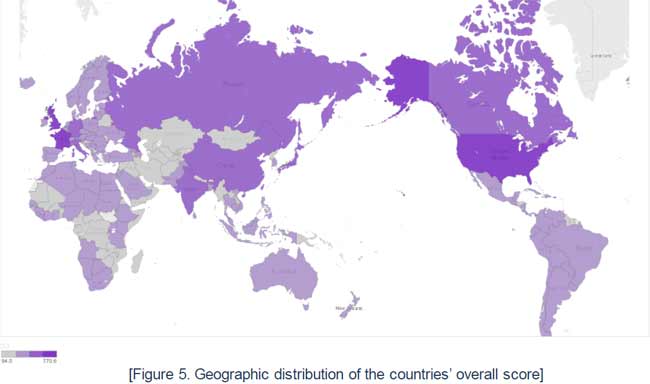


China’s provision of public goods to the world is expected to be strengthened, a recent report predicted. It is also expected that China will take a more active role in the global governance process, especially given the current climate of de-globalization.
The short-term plan focuses on promoting the sustainable growth of the global economy, including improvement of the Financial Stability Board, the establishment of a G20 Secretariat and construction of a Belt and Road Initiative “in which China and Asia will play the leading role to reinvigorate the economy and enhance regional cooperation,” according to the States’ Participation Index of Global Governance (SPIGG) World Report, issued on Sept. 22.
"China has benefited from globalization 1.0, wherein international organizations have supported China's development. Now it's an era of globalization 2.0, but the trend of de-globalization has taken shape ... Global governance at this time is no longer about international organizations but also countries. China is playing a more active role in the process," said Wang Huiyao, director of the Center for China and Globalization (CCG).
“Global governance reform requires China to play a role and share its wisdom. It is unimaginable for China to be absent from the world development agenda, climate change talks, IMF reform, counter-terrorism efforts, cyberspace security and other key global governance issues,” the SPIGG report noted, referencing China’s principle of non-interference in internal affairs and the nation’s efforts to bring mutual benefits.
“These two rules are very impressive. I want to point out that we are sticking to our principle of non-interference in internal affairs, but we are also protecting our interests and the safety of our people and property,” said Wang Shijie, former Chinese ambassador to Iran.
“Foreign interference is one of the key causes of chaos in the Middle East, as major nations provoke wars in the region … It will be very crucial for [effective] global economic governance and maintaining stable economic development, as it is also a main reason for the chaos,” Wang said.
Huang Xueqi, former secretary general of the China General Chamber of Commerce, U.S.A., pointed out that China used to avoid speaking out on topics like global governance due to a lack of economic and politic power.
“The fact that we are proposing it proves that we are now capable of contributing on this matter … But how our proposals such as the Belt and Road Initiative turn out is still reliant on national development,” Huang said.
These remarks were made at a seminar held by CCG, the Political Science Institute of East China under the University of Political Science and Law (ECUPL) and China International Publishing Group. The report, compiled by ECUPL, was also released at the seminar.

China currently ranks fourth in the SPIGG report, which analyzes 190 sovereign states across the globe to study their participation in and contribution to global governance. While the average score was 287, China earned a whopping 600.7. China came after only France, the U.K. and the U.S., with the U.S. scoring 770 in total – 108 points higher than its closest competitor.
SPIGG analyzed four main factors: mechanism, performance, decision-making and responsibilities. The organization determined that factors constitute a solid basis for understanding a nation’s role in the world.
While remarkable transformations have lately taken place in economic growth and soft power, a significant gap still remains between China and other Western leaders. Nevertheless, Huo Jianguo, former director of international trade and economic cooperation at the Ministry of Commerce, pointed out that world leadership is something to be gained gradually, through individual cases.


 Fire brigade in Shanghai holds group wedding
Fire brigade in Shanghai holds group wedding Tourists enjoy ice sculptures in Datan Town, north China
Tourists enjoy ice sculptures in Datan Town, north China Sunset scenery of Dayan Pagoda in Xi'an
Sunset scenery of Dayan Pagoda in Xi'an Tourists have fun at scenic spot in Nanlong Town, NW China
Tourists have fun at scenic spot in Nanlong Town, NW China Harbin attracts tourists by making best use of ice in winter
Harbin attracts tourists by making best use of ice in winter In pics: FIS Alpine Ski Women's World Cup Slalom
In pics: FIS Alpine Ski Women's World Cup Slalom Black-necked cranes rest at reservoir in Lhunzhub County, Lhasa
Black-necked cranes rest at reservoir in Lhunzhub County, Lhasa China's FAST telescope will be available to foreign scientists in April
China's FAST telescope will be available to foreign scientists in April "She power" plays indispensable role in poverty alleviation
"She power" plays indispensable role in poverty alleviation Top 10 world news events of People's Daily in 2020
Top 10 world news events of People's Daily in 2020 Top 10 China news events of People's Daily in 2020
Top 10 China news events of People's Daily in 2020 Top 10 media buzzwords of 2020
Top 10 media buzzwords of 2020 Year-ender:10 major tourism stories of 2020
Year-ender:10 major tourism stories of 2020 No interference in Venezuelan issues
No interference in Venezuelan issues
 Biz prepares for trade spat
Biz prepares for trade spat
 Broadcasting Continent
Broadcasting Continent Australia wins Chinese CEOs as US loses
Australia wins Chinese CEOs as US loses